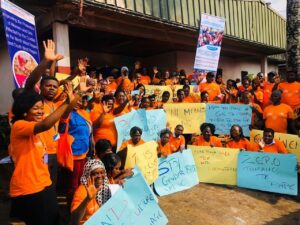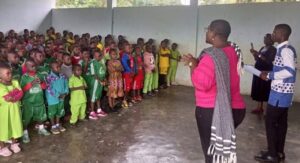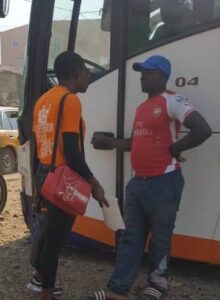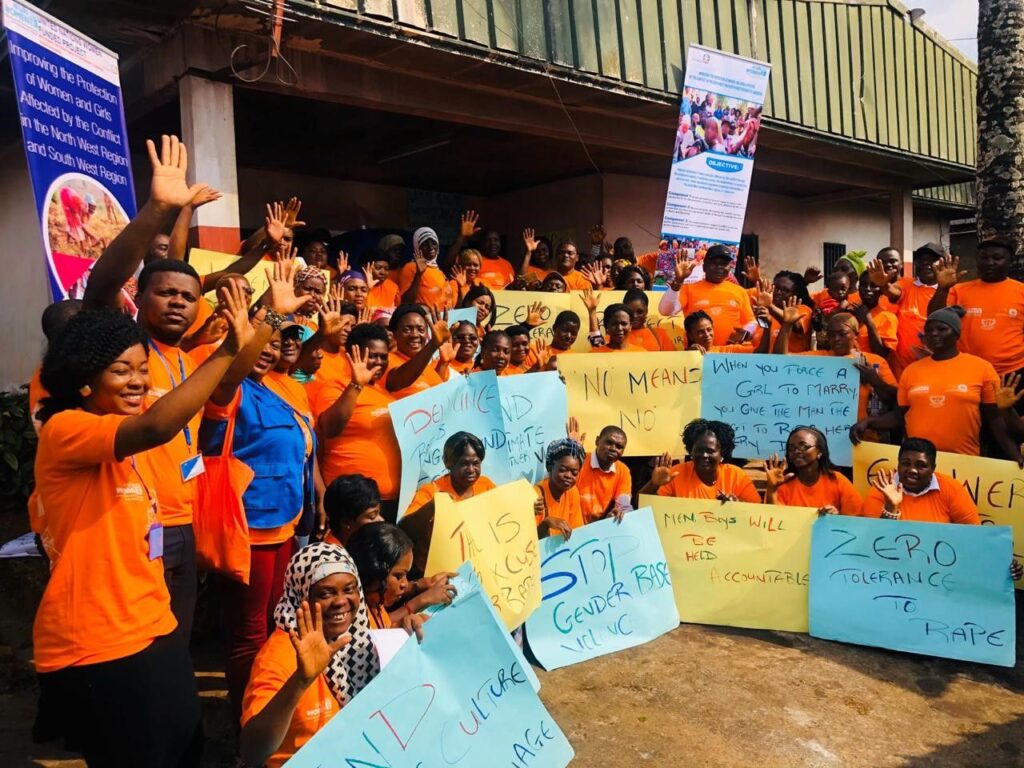This campaign was launched and implemented through a coalition of 02 prominent Networks and 1 International NGO as it is evident that to address such a critical subject, it requires concerted action to effectively tackle such obnoxious violations. The North West Association of Development Organisation (NWADO – a network of CSOs in the NW Region), Choose Life Generation International(an International NGO) and the Alliance for Cameroon Youth Associations(AC-YA -a network of Youth Association with over 125 member organisations) working on a project sponsored by UNICEF and the European Union are working on combatting against normalized rape and other forms of sexual violence of women in 45 communities in Anglophone Cameroon.

Due to the ongoing war, diminished policing, the inefficiency in normal operations of State institutions in the war ravaged areas in Anglophone Cameroon (like the Justice department, Social Welfare department), fear of reprisal by the population to denounce sexual violence have led to a geometric increase in the number of sexual assault and violence perpetrated by armed separatists, military personnel and civilians.
Between January and March of this year, there have been nearly 500 cases of rape and sexual or physical assault documented in the two regions according a report presented by Jess Craig for Aljazeera. Al Jazeera interviewed women across the regions, including victims, who spoke of a pervasive fear of sexual assault and violence perpetrated by armed separatists, military personnel and civilians. According to the report:
“Children and women are becoming more and more targeted,” said Esther Omam, a peace advocate based in Buea. “They are becoming the soft spot for this war.” Nkongho Christy Ayuk, a gender-based violence case manager at Reach Out, a local humanitarian organization, said after nearly five years of low-level fighting, the regions have devolved into a state of “lawlessness”. Consequently, sexual and gender-based violence including rape, sexual assault and abduction have become commonplace, according to several local and international human rights and aid groups. And the situation is worsening. Between January and March of this year, there have been nearly 500 cases of rape and sexual or physical assault documented in the two regions, and more than 500 other cases of gender-based violence including forced marriage, denial of economic resources and emotional abuse, data provided by the United Nations showed.

Between February and December 2020, the UN documented 4,300 incidents of sexual and gender-based violence across the two regions. Almost half of those were cases of sexual or physical assault or rape, and in more than 30 percent of those cases, the victims were children. In 2019, the UN had documented only 1,065 cases, 289 of which involved sexual assault or rape.
The most prominent of the sexual violence assault and attack incident is the case documented by Human Right Watch(HRW) where they reported that: “An attack by Cameroonian soldiers on March 1, 2020 has come to light in which soldiers raped at least 20 women, including four with disabilities, arrested 35 men, and killed one man, Human Rights Watch said today. The attack on the village of Ebam in the South-West region was one of the worst by Cameroon’s army in recent years.
The soldiers also burned one home, looted scores of properties, and severely beat the men they took to a military base. Based on information obtained by Human Rights Watch, there has been no effective investigation, and no one has been held accountable for the crimes.”
Witnesses said that over 50 soldiers entered Ebam, in Manyu division, in the South-West region, at about 3 a.m. on March 1, 2020, on foot leaving their vehicles in the outskirts. They broke into almost all the 75 homes in the village, looting money and other items, and dragging men out. Some soldiers rounded up men in the village center, while others sexually assaulted the women, including four with disabilities, mostly in their homes.
“Five masked soldiers entered my home,” a 40-year-old woman told Human Rights Watch. “It was dark, and I was alone. They searched the house and stole my phone and money. One of them abused me. He said: ‘If you don’t have sex with me, I will kill you!’ I was too afraid to say or do anything. After the rape, I ran into the bush where I spent two months. I am still upset and traumatized.” (See report here: https://www.hrw.org/news/2021/02/26/cameroon-survivors-military-assault-await-justice ).
After the first 06 months of implementation of the project, the coalition succeeded in recording great successes.

More than 100,000 members of the public including pepertators were sensitised via various media, that is radio, TV, social media, flyers(200,000 flyers were printed and distributed in churches, markets, motor parks, community meetings), our collaboration with traditional authorities and church authorities also yielded lots of fruits in sensitizing and educating the public on the obnoxiousness of rape/sexual violence on women and most especially on the girl child.
764 cases of women who have suffered sexual violence were identified, with the highest number from Batibo (Momo Division) and Belo(Boyo) Sub Divisions of the North West Region and the highest Division with highest number of sexual violence cases were reported in Manyu Division of the South West Region.
Out of 764 cases identified, 698 were provided psychosocial first aid to avoid Posttraumatic Stress Disorder (PTSD) and from victims to suffer Rape Trauma Syndrome(RTS);
89 were provided medical support and treated from situations involving injuries and wounds sustained during the process of resisting the rape. Some cases who were identified immediately after the rape incident or with Genital injury, Extragenital injury, Psychologic trauma, Hepatitis, HIV infection, Human papillomavirus infection, Other sexually transmitted infections (STIs—eg, syphilis, gonorrhea, chlamydial infection, trichomoniasis), Bacterial vaginosis, Pregnancy

53 benefited from medical assessment and treatment of injuries and assessment, treatment, and prevention of pregnancy and STIs, Collection of forensic evidence, Psychological evaluation, Recommendation of crisis intervention and psychological support
We are following up to have the possibility to provide judicial support in order to prosecute some of the perpetrators we identified to court in order to prosecute them, so that such actions can be deterred and also a form of healing for some victims who will be satisfied justice has been delivered. Also, we will be sourcing funds to rehabilitate them by setting income generating activities, to permit them to be economically independent and have control over their body/get them busy in order to be forgetting about the incident.
The project has been a great success and sensitization and education campaigns will continue in the community, victim identification , provision of psychosocial first aid , case management etc will continue according the officially approved plan of action.
Ade Stella Nde,
Project Coordinator

